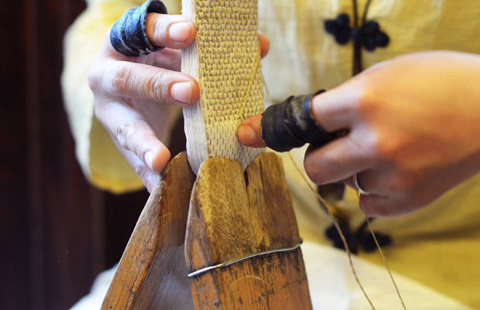Early education is too early and too much
By Wang Zhuoqiong (China Daily) Updated: 2015-06-01 07:03Last week, my friend Lily Peng proudly shared a photo on WeChat of her 3-year-old son sitting opposite a native English speaker in a colorfully decorated classroom. It was a one-on-one English learning course in which she enrolled her son at a cost of 70,000 yuan ($11,300).
I understand the importance for Lily of having her son learn a foreign language. But how much a child can really learn when, outside of the classroom, he doesn't have a chance to use this knowledge, is questionable.
But the mushrooming of early education institutions makes it not only "necessary" to do this, but also leads to a competition among parents and even parents-to-be.
It would be shocking if new parents didn't enroll their child in an early education class in their neighborhood. Despite all the theory and good intentions about children learning and playing as early as possible, putting a less than 1-year-old child in a 20-square-meter "classroom" in a shopping mall filled with at least 20 adults and 10 children is indeed an "education"-the chances they could catch flu there could be very high.
Early education has actually evolved into over-education.
Another friend, Alice Zhang, sends her 7-year-old daughter to lessons for the piano, English and art every week, mostly on weekends. Alice insisted on the piano course even though her daughter didn't appear to enjoy it.
Unwilling to identify herself as a typical "tiger mom", Alice said she doesn't necessarily want her daughter to become a musician, but thinks it is beneficial for a child to have some hobbies as it will help them become more popular among their peers.
This attitude has become very prominent among parents, who take their children's early education so seriously that it could be viewed as a way for them to compensate for what they did not accomplish in their own childhood.
"My parents only cared about my academic performance. Now that I'm grown up I don't have any hobbies or interests, and that's not much fun," said Zhang.
The investment in terms of money and time in these courses does not disturb these passionate and sacrificing parents.
What concerns them more is finding a course which will deliver results from among the huge number on offer.
Zhang's greatest concern is about the piano lessons, as she lacks any knowledge in this field.
"How would I know," Zhang said. "I don't play the piano, so I am unable to judge in terms of the quality of tutors or training institutions," she added.
- Tibetan dreams kept alive at city schools
- Not just an academic issue
- World's 15 most valuable brands of 2015
- Book marks Lenovo's decade of rapid global expansion
- OnePlus pushes smartphone boundary ever further
- Gucci launches 50% discount in China
- Brazilian trade mission to visit China to promote beef exports
- China praises FTSE move to include A-shares in global benchmarks

















